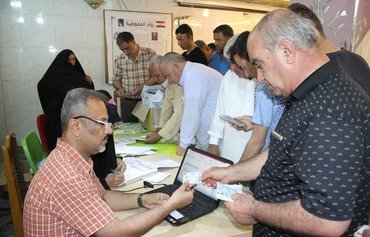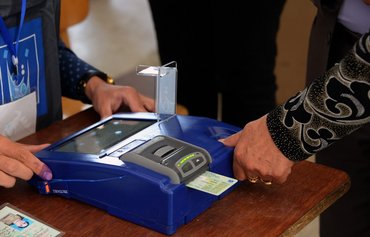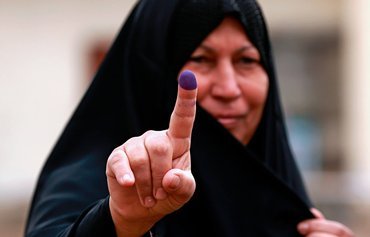Iraqis will vote May 12th in the fourth parliamentary elections since 2005, the first since Iraq declared victory over the "Islamic State of Iraq and Syria" (ISIS).
In the roughly two months leading up to the elections, the government will be working to overcome one of the key challenges to the elections -- ensuring internally displaced persons (IDPs) can exercise their right to vote.
Over the course of three years, around five million Iraqis were displaced by ISIS, half of whom have now returned to their homes in liberated areas.
The remaining IDPs, mostly from Ninawa province, are still stuck in displacement camps as their homes and basic services in their areas have been completely destroyed.
Ensuring the right to vote
The Ninawa Electoral Commission is working to "ensure that no eligible voter, particularly IDPs, loses their right to vote", commission spokesman Farhan al-Kiki told Diyaruna.
The first phase of the commission's programme to facilitate the election process will include the establishment of 140 polling stations to receive voters on election day, he said, 80 of which are already in place.
"These centres are spread across districts and neighbourhoods in the province, including the eastern and western parts of Mosul," he said.
The commission will hand out voter registration cards, al-Kiki said, and has been working with government authorities to ensure these cards are issued to IDPs so they can take part in the electoral process.
During the programme's second phase, which involves logistical and technical operations on election day, he said, "the commission will make sure that everything is in place for displaced voters to cast their vote without any trouble".
Al-Kiki said he was optimistic the election would see high voter turnout, pointing out that "during previous elections, conditions were very difficult, and even then people voted".
"Today, things are good ... which is why we hope that voter turnout is high," he said.
Verifying IDP identities
The Ministry of Migration and Displacement will be working hand-in-hand with the Electoral Commission to ensure the voting process goes smoothly, Khaled Abdul Karim, director of the ministry's office in Ninawa, told Diyaruna.
"We have introduced a database of IDPs, which will be used for the elections," he said. "We are currently conducting a detailed survey of all IDPs who are 18 and above, the legal age to vote, who live in displacement camps and shelters."
As a preliminary estimate, the ministry has managed to collect data on 50,000 IDPs eligible to vote, he said, noting that this includes date and place of birth and other personal information.
"After the data collection process is completed, we will submit it to the Electoral Commission to be used as a way to confirm voters’ identities," he said.
"Our province has the highest number of IDPs spread across several large camps," Ninawa provincial council member Hussain Shabib told Diyaruna.
Each one of these displacement camps must have at least one polling station, he said, stressing the importance of opening enough voting centres.
'A national responsibility'
"We are optimistic that Iraqis of all classes and sects will participate strongly in the upcoming electoral process," Iraqi MP Ali al-Allaq told Diyaruna.
This optimism is based on the high rate of registration for voter cards in Baghdad and in other provinces, he said.
"The citizens' enthusiasm and determination to participate is growing day by day as the election date approaches, and they feel that their participation is a national responsibility," al-Allaq said.
Despite sporadic outbreaks of violence from ISIS remnants, the security situation is much improved across Iraq.
"Today, the situation is generally stable and secure, thanks to the great victory over terrorism, which will certainly be a strong incentive to voters," al-Allaq said.
For those looking to make a positive change, elections are a "democratic tool available to citizens to change their reality for the better", he added.

![Members of the Iraqi forces keep watch as voters arrive at a polling station in Baghdad's Sadr City during the country's general elections on April 30th, 2014. [Ahmad al-Rubaye/AFP]](/cnmi_di/images/2018/03/08/11767-Iraq-polling-station-600_384.jpg)






